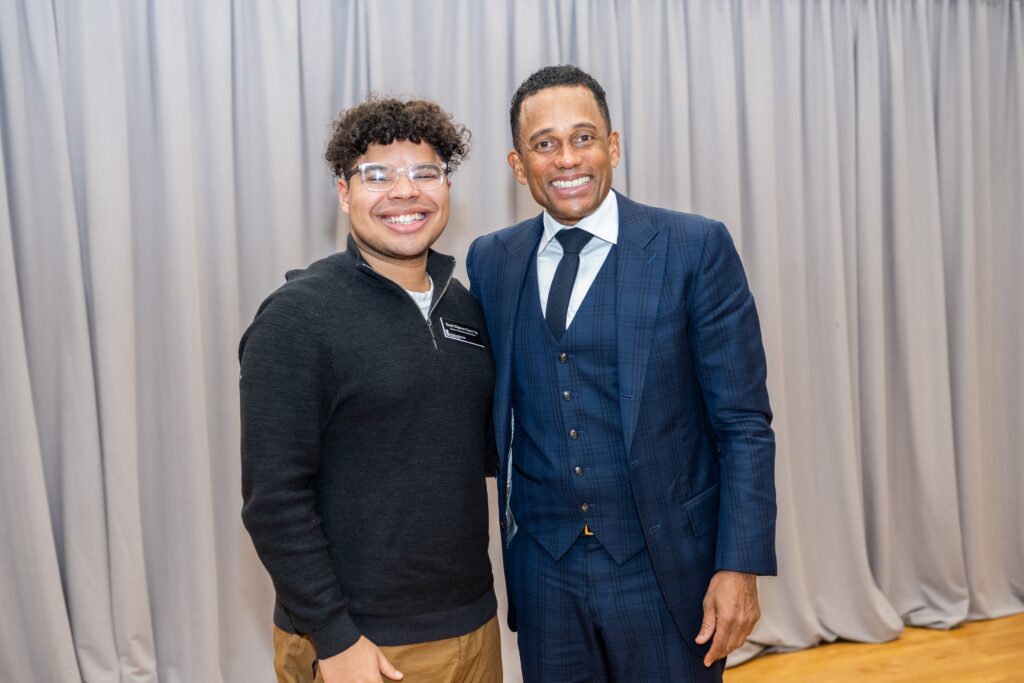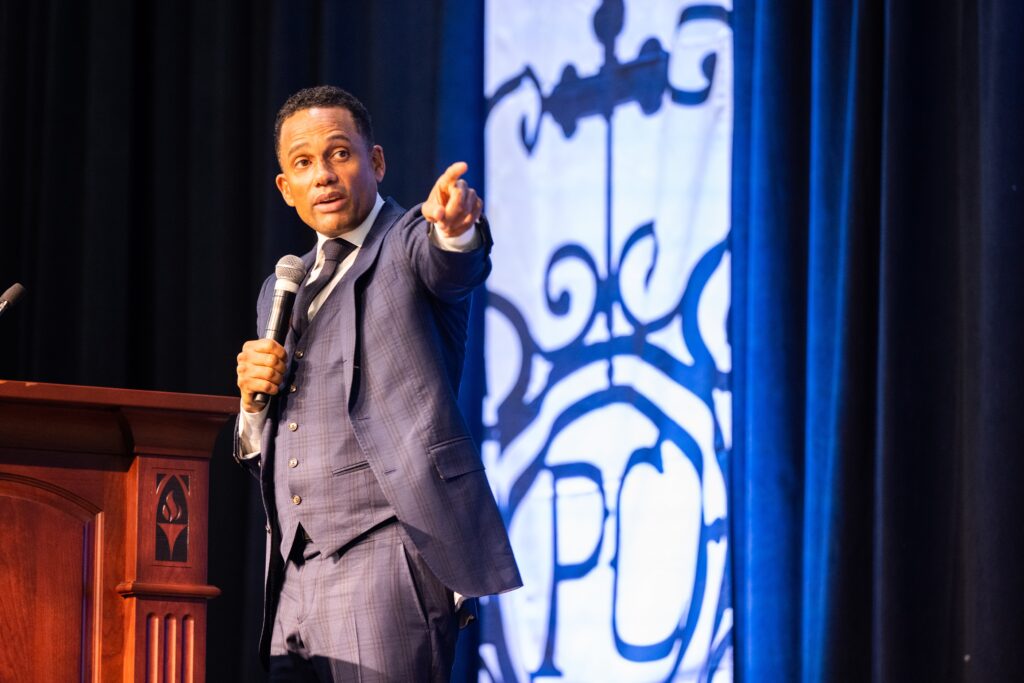PCSB Presents: A Conversation with Hill Harper

Actor, activist, and entrepreneur Hill Harper was the keynote speaker for Providence College’s annual Rev. Dr. Martin Luther King Jr. Convocation, which took place on January 26. As part of the festivities, marketing major and theatre minor Santiago “Santi” Najarro Cano ’24 had the opportunity to interview Harper. The following transcript has been edited for length and clarity.
Santi Najarro Cano: You talked about financial literacy and the racial wealth gap. Where do you see the racial wealth gap in the next five to 10 years?
Hill Harper: You hear Dr. King talk about the fierce urgency of now. This is because technology, as we all are aware, is creating bigger gaps. If we don’t use technology for good, to try to decrease the gap, we are creating a society that is vastly disproportionate in terms of wealth, access, and opportunity. I don’t know how you come back from it. This is the time where we have to hyper-focus on the wealth gap.
I think these next five to 10 years are going to determine [the trajectory of things]. If we really are going to be honest and break down what’s happening, it’s no coincidence that the billionaires of this world are figuring out how they’re traveling to different planets. People are setting things up that this planet’s going to get left in the dust. I mean that’s where we’re headed. And it’s the microcosms happening in many countries. You go to so many countries where you have all these gated communities and then people living in shanties right out there. If we don’t, that’s going to happen here. That’s where we’re heading. What does that look like? It looks like police states. It’s gross, and it’s unconscionable.
Through arts, I could impact social justice movements, and I wouldn’t have to get as political, but I could do it artistically. I’m not sure that’s the case anymore because people have hijacked politics. And so now I’m thinking I’m going to have to, and it leaves such a bad taste in my mouth. But it’s almost like, you can’t talk about it and not be about it. And that’s why I made that comment about the flag.
SNC: To me, that’s very clear for people to understand. I didn’t even think of it like that. It used to be because I’m Colombian-Cuban and I wear those two flags proudly. But when I look at the American flag, I’m not as proud, but that’s not what Dr. King envisioned at all.
HH: And I didn’t really process or think about it until now, until you said it. That’s not what he would’ve wanted. But that’s also like, as an American, that’s not something that represents, that unites all of us. It shouldn’t be as polarizing as the American election. We should grab the flag back. It’s been co-opted. When I say that, people say it’s gone. I said, “No, it can’t be gone.” We have to fight a good fight and wear it proudly and not let someone dictate what it is. We determine that then.

SNC: I’m in a business law class right now, so sometimes I’m listening and understanding, and the term “financial literacy” always comes up. And I know in your work, you talk about financial literacy. How important is financial literacy for BIPOC individuals? What are ways that you can improve your financial literacy?
HH: Like anything else online, you have to be really careful who you’re getting your information from, because there’s so many “financial literacy gurus” not giving good advice. At the end of the day, it’s about understanding that there’s power and energy in the money, and how you use it can make it either work for you or work against you. That’s what I kind of like. Try to distill it down.
So most people from marginalized communities are used to taking [money] and only thinking short term which gets them caught up in debt. So, there’s a constant extraction, and my argument is based in financial literacy. Can you figure out a way to make the money work for you? Rather than you working for [the money] or always paying off minimums in terms of debt.
That’s what my emphasis is when it comes to financial literacy. Get people out of cash. Most marginalized communities have a mattress money mentality. A cash central mentality. If most of your money is in cash, every time you go to sleep, you’re poor.
The next is that we have to get our communities into ascending value asset classes, and those are the things that they’ve been blocked from the most. Home ownership. Blue chip stocks. There’s all these barriers to entry into those asset classes. The beautiful thing about technology today is that those barriers are being stripped down by technology, but if you’re able to educate people properly, you can actually get them into these asset classes in a very low-cost way. My whole thing is dollar cost averaging. I talk about it all the time, and just getting out of cash and dollar cost averaging, that’s my big push. We don’t need to teach people how to be day traders. That’s not what folks need to think about. Slow and steady wins the race. Take some cash and put it somewhere that it will grow over time. That’s the idea.

SNC: What piece of advice would you like to give to yourself or to anybody?
HH: It’s really about what’s in your heart. We all have something. It could be animals, it could be investing, it could be acting, it could be gardening. It doesn’t matter what it is. I try to get people to not think about “job-related” what makes the most money. Because that automatically limits what people think. I try to use myself as an inspiration. I’ve got two graduate degrees from Harvard, and I was waiting at a 24-hour diner—with two grad degrees! Everybody was telling me I was the stupidest person. I’m a waiter, I’m wasting time. People tried to actually make me feel guilty as if I took someone else’s place at Harvard. I should be ashamed because I’ve wasted.
It’s like you we’re all on our own journey. You’ve got to follow your heart. And I think that gets lost a lot with messaging, particularly the fear-mongering of particularly young students. You’ve got to get out and find a job. And what’s even more important is this idea that you guys that are under 25, you’re probably going to live to be one hundred minimum. [Motions to SNC] How old are you?
SNC: 21.
HH: So, if you break up the next 130 years, realistically for yourself, you could have three completely different 35-year careers with 10 years in between each to learn a new skill. Think about that. No previous generation could ever think that way. That should open you up to a level of fearless freedom that no previous human has ever been able to think. Every previous human generation has had to think in terms of one career, and a long retirement. Or maybe never even getting to retire. So, folks started dying at 40, then at 50, then at 60, and then at 75. Then folks start dying at 85. Now folks are dying around 90, barring some horrible pandemic.
Read more: MLK Convocation speaker Hill Harper addresses structural inequalities




